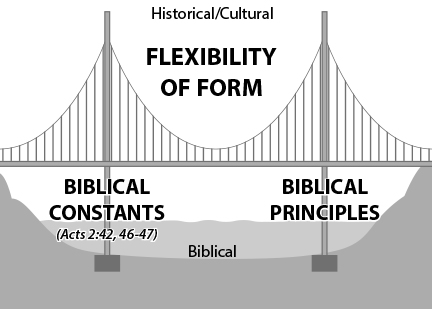The Bridge
Balancing Biblical Faithfulness and Cultural Sensitivity

Every grounded and mature believer would maintain that the Scriptures must guide us as our supreme and final authority in understanding and shaping our worship.1 After all, worship is about God, and it is through the Scriptures that God has revealed to us his nature and ways. Worship is likewise for God, and it is the Scriptures that tell us what he expects of us creatures. The Bible is to be our guide in every area of life. So certainly in this crucial area of worship, we must look to it to guide us.
 People change. Times change. Cultures change. Only in the pages of Scripture can we hope to find an unchanging standard for our worship. And with all the debates about worship forms, styles, and practices which continue to rage today, the church of Jesus Christ desperately needs a unifying understanding of the unchanging, nonnegotiable foundations of worship—and we must turn to the Scriptures for that purpose.
People change. Times change. Cultures change. Only in the pages of Scripture can we hope to find an unchanging standard for our worship. And with all the debates about worship forms, styles, and practices which continue to rage today, the church of Jesus Christ desperately needs a unifying understanding of the unchanging, nonnegotiable foundations of worship—and we must turn to the Scriptures for that purpose.
Yet even with this commitment to the Scriptures as our guide for worship, we immediately run into a problem when we go to the New Testament for models and guidelines for congregational worship. That problem has been summarized by John Piper as the “stunning indifference” of the New Testament writers to issues of form and practice in corporate worship.2
We search the pages of the New Testament in vain for detailed instructions, much less structures or liturgies. Even in the Epistles, where we might reasonably expect Paul and the other writers to address these issues as they write to guide brand new churches, we find frustratingly few details.3
This presents us with a crucial question: just what is it in the Bible that is supposed to govern and determine our worship? It is a reasonable assumption that the virtual silence of the New Testament writers on the matters of form and style for worship means that the Lord intends for us to have considerable latitude and flexibility in these areas. Yet our worship services still need to look like something, so how are we to make choices? Is it just a case of “anything goes”?
A MODEL FOR BIBLICAL GUIDANCE AND FREEDOM: “THE SUSPENSION BRIDGE”
I would like to suggest a model that gives biblical guidance, yet at the same time allows for biblical freedom. By way of illustration, this model may be based on certain characteristics of a suspension bridge, similar to the Brooklyn Bridge in New York City or the Golden Gate Bridge in San Francisco.
In a suspension bridge, the weight is supported by both the towers and the suspension cable. The towers are sunk deep in the earth and are meant to be as stable and immovable as possible. The suspension cable, or span, on the other hand, while sharing a significant portion of the load-bearing, has by design a great deal of flexibility to expand and contract, thus allowing the bridge to withstand variations in temperature, wind, weight load, and other conditions. It should also be pointed out that, while both the stationary columns and the flexible span are important parts of the bridge’s construction, it is ultimately the cable that transfers much of the weight of the road bed and its traffic to the towers, so that the towers are crucial to the bridge’s integrity and durability.
 What can we learn about our worship from this illustration? Our worship needs to be supported by firmly rooted biblical foundations—the two towers of the bridge. The flexible cable span suggests the liberty that the New Testament seems to allow for individual faith communities to constitute their corporate worship in ways that fit their situation. Like any art form, Christian worship allows for much creative expression, but within defined parameters. The Bible provides for those parameters, as well as that freedom.
What can we learn about our worship from this illustration? Our worship needs to be supported by firmly rooted biblical foundations—the two towers of the bridge. The flexible cable span suggests the liberty that the New Testament seems to allow for individual faith communities to constitute their corporate worship in ways that fit their situation. Like any art form, Christian worship allows for much creative expression, but within defined parameters. The Bible provides for those parameters, as well as that freedom.
THE FIRST TOWER: “BIBLICAL CONSTANTS”
The first tower suggests an immovable aspect of Christian worship that we could term “Biblical Constants.” These are non-negotiables, elements that simply must be present for our worship to be considered Christian.
What are these elements? One clue may be found in Acts 2. Luke has just recounted the events of the day of Pentecost: the coming of the Holy Spirit upon Jesus’ followers, Peter’s sermon, and the conversion and baptism of about three thousand people (2:41). In the very next verse, Luke tells us what these believers did when they gathered together: “And they devoted themselves to the apostles’ teaching and to fellowship, to the breaking of bread and to prayer . . . praising God and enjoying the favor of all the people” (2:42,47; italics added). The words in italics suggest a list of crucial activities for the people of God when they congregate:
- The word of God
- Fellowship
- The Lord’s Supper
- Prayer
- Praise
A number of commentators have assessed these verses as something more than simply a description of what the earliest church did, but rather as a prescription of normative practice for the church of all ages.4 Indeed I have often given an assignment to students to list what activities are consistently found in every Christian worship service, in every denomination around the world, and down through history—and the results they come up with generally correspond very closely with the list found in Acts 2:42,47! These elements seem to be nonnegotiable constants which define and characterize truly Christian worship—elements that must therefore be represented in some form in every church’s corporate gatherings.5 These “Biblical Constants” serve as one foundational pillar for our worship.6
THE SECOND TOWER: “BIBLICAL PRINCIPLES”
Just because the New Testament does not provide many specifics about how to do worship in local congregations, this does not mean that “anything goes” and that we have no biblical guidance concerning worship. As with other areas or practices in our lives that are not specifically addressed by the Scriptures (e.g., movies, smoking, internet use), there are most certainly biblical principles in God’s word to be applied with wisdom and honesty to our situation and worshiping in it. There are a host of principles that can be drawn from the pages of Scripture to guide us and to guide the leadership of local churches in fashioning biblically appropriate yet culturally meaningful expressions of worship. These principles serve as the second tower in our illustration, giving further stability and strength to the worship structure as a whole.
Biblical principles are different from biblical constants because, as has already been mentioned above, principles must be applied and sometimes applied differently in different situations.
What follows then is a list of biblical principles that pertain to the practice of worship in the local church.7 In each case, the principle is stated, followed by a supporting scripture verse (or verses) and an explanatory paragraph.
1. God’s glory, and our joyful celebration of it in worship, should be the focus and goal of all life and ministry.
“Whether, then, you eat or drink or whatever you do, do all to the glory of God.” (1 Cor 10:31 NASB)
2. Worship is first and foremost for God.
“Worship God.” (Rev 19:10; 22:9 NASB)
3. Worship is a dialogue between God and his people, a rhythm of revelation and response.
“Great is the Lord and greatly to be praised.” (Ps 96:4 NASB)
4. The Word must be central in our worship.
“Praise Him according to His excellent greatness.” (Ps 150:2 NASB)
5. Worship is the responsibility of all God’s people.
“So we your people and the sheep of your pasture will give thanks to you forever.” (Ps 79:13 NASB)
6. Our worship is acceptable in and through Christ our High Priest.
“In the midst of the congregation I will sing your praise.” (Heb 2:12, NASB)
7. Our response of worship is enabled, motivated, and empowered by the Holy Spirit.
“We are the true circumcision, who worship in the Spirit of God and glory in Christ Jesus and put no confidence in the flesh.” (Phil 3:3 NASB)
8. Worship is the response of our entire lives to God.
“Therefore I urge you, brethren, by the mercies of God, to present your bodies a living and holy sacrifice, acceptable to God, which is your spiritual service of worship.” (Rom 12:1 NASB)
9. God is much more concerned with our heart than with the form of our worship.
“I delight in loyalty rather than sacrifice.” (Hos 6:6 NASB)
10. Worship should promote the unity and edification of the body.
“Now may the God who gives perseverance and encouragement grant you to be of the same mind with one another according to Christ Jesus, so that with one accord you may with one voice glorify the God and Father of our Lord Jesus Christ.” (Rom 15:5,6 NASB)
11. Young and old need each other in the body of Christ.
“Young men and maidens, old men and children: Let them praise the name of the Lord, for his name alone is exalted.” (Ps 148:12,13, NIV 1984)
12. These things must be taught and retaught.
“Finally then, brethren, we request and exhort you in the Lord Jesus, that as you received from us instruction as to how you ought to walk and please God (just as you actually do walk), that you excel still more.” (1 Thess 4:1 NASB)
THE SPAN: FLEXIBILITY AND FREEDOM
The span, with its built-in elasticity and flexibility, represents the freedom that the New Testament seems to allow for wise, prudent, and biblically based application of culturally meaningful expressions. The “heart language of the people” is to be considered when making decisions about forms, styles, music, and other artistic expressions of faith.
 We can certainly see the application of this principle, consciously or not, in the vast array of worship expressions that have developed throughout the history of the Christian church and in churches around the world today. There has been, and is, an enormous variety in terms of architecture, atmosphere, form, structure, style, dress, music, liturgy, and other expressions. God, who has created the world and humanity with such incredible diversity, must certainly rejoice in such worship variety from his people.8 One would never use Bach organ fugues for worship in an African tribal village—a form that would have little or no meaning for this people. And conversely, some of the most natural cultural expressions of various African villages would be incomprehensible to most northern Europeans. In many contexts in Africa, drums are the primary instrument for worship—not a debated add-on! Recent developments in missions have given more weight to the importance of helping local faith communities develop their own indigenous forms of worship music, rather than simply borrowing and translating songs from the West—as was the practice for far too long in many church planting contexts.
We can certainly see the application of this principle, consciously or not, in the vast array of worship expressions that have developed throughout the history of the Christian church and in churches around the world today. There has been, and is, an enormous variety in terms of architecture, atmosphere, form, structure, style, dress, music, liturgy, and other expressions. God, who has created the world and humanity with such incredible diversity, must certainly rejoice in such worship variety from his people.8 One would never use Bach organ fugues for worship in an African tribal village—a form that would have little or no meaning for this people. And conversely, some of the most natural cultural expressions of various African villages would be incomprehensible to most northern Europeans. In many contexts in Africa, drums are the primary instrument for worship—not a debated add-on! Recent developments in missions have given more weight to the importance of helping local faith communities develop their own indigenous forms of worship music, rather than simply borrowing and translating songs from the West—as was the practice for far too long in many church planting contexts.
The virtual silence of the New Testament as to the specifics of congregational worship practice seems to allow for local churches, as the fundamental unit of the body of Christ on earth, to have considerable autonomy and freedom in such specifics. Individual or clusters of congregations can work out the issues involving the balance of biblical constants and flexibility in the worship of their own churches. This does not mean that it is an easy task, however, as recent history has amply demonstrated. The so-called “worship wars” are symptomatic of the kind of danger into which freedom of this sort can cast us, and we might indeed be left wishing that Paul had simply prescribed a set liturgy for all time and left it at that! God obviously wants his people to apply biblical wisdom and discernment in this, as well as in many other areas where he has chosen not to spell everything out for us.
CONCLUDING REFLECTIONS
“Man looks at the outward appearance; but the Lord looks at the heart” (1 Sam 16:7 NASB). We squabble about so many little things related to worship, but God is looking for people who will worship him in spirit and truth. The externals are not nearly as important to him as they are to us! God is not as worried about which songs you sing as he is about you “making melody with your heart to the Lord” (Eph 5:19 NASB).
In today’s raging worship debates we desperately need to see that there are biblical constants and principles that we can really agree on. And then we need to have the grace and maturity to allow for the flexibility for which God seems to allow. There is far more that binds us as worshipers than divides us through our different expressions—“there is one body and one Spirit—just as you were called to the one hope that belongs to your call—one Lord, one faith, one baptism, one God and Father of all, who is over all and through all and in all” (Eph 4:4–6, NIV 1984). Let us obey Paul’s command to “walk in a manner worthy of the calling to which you have been called, with all humility and gentleness, with patience, bearing with one another in love, eager to maintain the unity of the Spirit in the bond of peace” (Eph 4:1–3, ESV).
photo credit:
Photo: Women in the DRC respond to hearing a Bible story told in their heart language. Photo credit: Alan Hood © Wycliffe Canada 2011.









comments